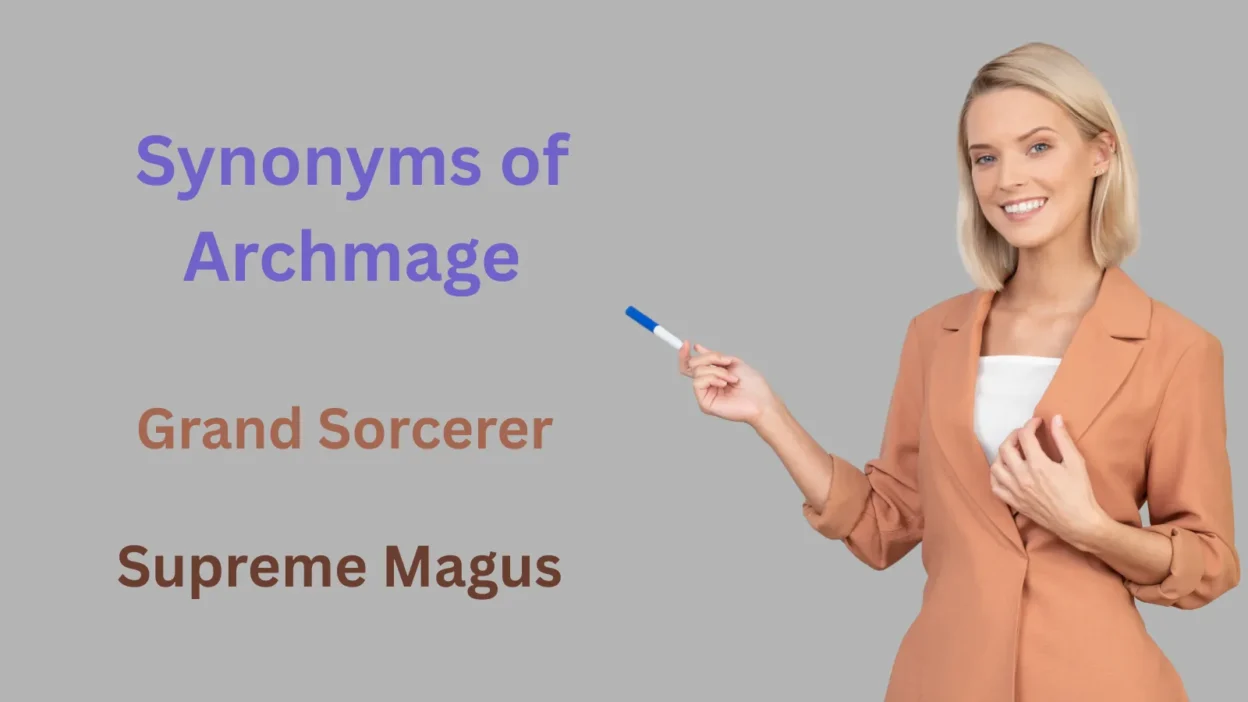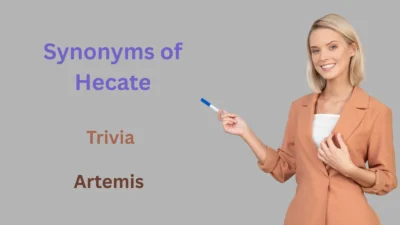Synonyms of archmage, such as sorcerer, grand wizard, and master magician, describe powerful magic users who hold great wisdom and skill. For example, an archmage might control ancient spells, lead magical orders, or guard forbidden knowledge.
Using the right synonym for archmage helps you set the right tone — whether you’re writing fantasy fiction, game lore, or mythical storytelling. Each word shows a different side of magical power, from scholarly mastery to mystical authority.
If you’re exploring fantasy worlds or describing legendary spellcasters, choosing precise synonyms for archmage brings depth and wonder to your writing. In this guide, you’ll find rich alternatives, their meanings, and how to use them to make your stories come alive.
What Does Archmage Mean?
An archmage means a master of magic — the highest-ranking and most skilled magician in fantasy worlds. The word combines arch, meaning “chief” or “great,” with mage, meaning “magic user.” Together, it describe someone with unmatched wisdom, control, and magical power.
In stories, an archmage is often a teacher, protector, or leader of other sorcerers. They might guard ancient secrets, study forgotten spells, or balance the forces of light and darkness.
Depending on how it’s used, archmage can suggest:
- Supreme magical authority
- Deep knowledge or wisdom
- Leadership within a magical order
- Mystery and supernatural mastery
It’s not just about power — an archmage symbolizes discipline, experience, and the responsibility that comes with great knowledge.
30 Synonyms & Related Words for Archmage(And When to Use Them)
1. Grand Sorcerer
Description: A sorcerer of great rank and mastery in magic.
Example: “The Grand Sorcerer presided over the council of mages.”
Usage: Best in formal or institutional magical settings; evokes hierarchy and respect.
2. High Wizard
Description: A wizard of the highest order or authority.
Example: “The High Wizard of Eldoria guarded the ancient spells.”
Usage: Suitable for fantasy worlds with councils or orders of magic.
3. Supreme Magus
Description: A master magician with ultimate knowledge and control of magic.
Example: “The Supreme Magus was said to command both light and shadow.”
Usage: Very formal or mythic; ideal for epic or ceremonial tones.
4. Grandmaster Wizard
Description: A wizard who has reached the highest level of magical mastery.
Example: “Only the Grandmaster Wizard could unlock the ancient seal.”
Usage: Perfect for RPGs, game lore, or structured magical hierarchies.
5. Chief Mage
Description: The leader or head among a group of mages.
Example: “The Chief Mage led the apprentice wizards into battle.”
Usage: Emphasizes authority; practical and administrative tone.
6. Elder Magician
Description: A wise, aged magician with deep knowledge.
Example: “The Elder Magician had seen centuries pass through his crystal orb.”
Usage: Evokes wisdom and longevity rather than raw power.
7. Archwizard
Description: A high wizard or leader among wizards.
Example: “The Archwizard of the North mastered the elemental arts.”
Usage: Direct synonym; interchangeable with archmage in fantasy writing.
8. Sage
Description: A wise and learned person, often with mystical insight.
Example: “The Sage of the Mountains spoke in riddles of truth.”
Usage: Philosophical or spiritual tone; less about magic, more about wisdom.
9. Mystic
Description: One who seeks hidden truths or magical enlightenment.
Example: “The Mystic lived in isolation, studying the stars.”
Usage: Soft, spiritual, and reflective; emphasizes inner power.
10. Warlock
Description: A male sorcerer, sometimes associated with dark or forbidden magic.
Example: “The Warlock’s curse haunted the village for generations.”
Usage: Dark or sinister tone; use when describing morally ambiguous figures.
11. Enchanter
Description: A spellcaster skilled in enchantments and charms.
Example: “The Enchanter wove spells that bent the will of kings.”
Usage: Ideal for elegant or subtle magic; emphasizes charm and control.
12. Magus
Description: A learned practitioner of magic, often philosophical.
Example: “The Magus studied the ancient runes by candlelight.”
Usage: Classical and scholarly; evokes ancient mysticism.
13. Grand Enchanter
Description: A master of enchantments and illusions.
Example: “The Grand Enchanter could make armies vanish with a word.”
Usage: Regal or majestic tone; for characters defined by finesse in magic.
14. Spellmaster
Description: A magician who has complete mastery over spells.
Example: “The Spellmaster’s power could reshape reality itself.”
Usage: Emphasizes technical control; good for gaming or heroic contexts.
15. Thaumaturge
Description: A miracle worker or performer of magical feats.
Example: “The Thaumaturge’s miracles blurred the line between magic and divinity.”
Usage: Scholarly or religious tone; ideal for mystic or ancient settings.
16. Sorcerer Supreme
Description: The greatest sorcerer alive, protector of magical balance.
Example: “The Sorcerer Supreme stood between the realms to maintain order.”
Usage: Popularized by Marvel; modern and heroic tone.
17. Arcane Master
Description: One who has mastered arcane or secret magical knowledge.
Example: “The Arcane Master held dominion over spells of every element.”
Usage: Neutral and versatile; works well in fantasy games or novels.
18. Spellbinder
Description: A magician capable of mesmerizing or entrancing others.
Example: “The Spellbinder’s voice could silence an army.”
Usage: Expressive and poetic; emphasizes hypnotic or captivating magic.
19. Wizard King
Description: A ruler who also possesses immense magical power.
Example: “The Wizard King conquered realms with both sword and sorcery.”
Usage: Regal and powerful; combines authority and magic.
20. Grand Mystic
Description: A high spiritual or magical authority.
Example: “The Grand Mystic revealed the prophecy under the blood moon.”
Usage: Elegant and ceremonial; fits mystical orders or cult-like contexts.
21. Adept
Description: A person highly skilled in the magical arts.
Example: “The Adept quickly mastered spells beyond his rank.”
Usage: Suitable for describing skilled practitioners below archmage level.
22. Spellwright
Description: One who crafts or writes powerful spells.
Example: “The Spellwright inscribed runes that glowed with forbidden power.”
Usage: Creative or technical tone; ideal for world-building contexts.
23. Magister
Description: A teacher or master of magical theory.
Example: “Magister Elion lectured on the laws of alchemy.”
Usage: Academic or institutional; conveys authority through intellect.
24. Wizard-Lord
Description: A powerful wizard who holds territory or leadership.
Example: “The Wizard-Lord ruled his domain with enchanted iron.”
Usage: Combines nobility and magical dominance.
25. Seer
Description: One gifted with foresight or prophetic vision.
Example: “The Seer’s prophecies guided the realm for centuries.”
Usage: Mystical and predictive tone; focuses on insight rather than spellcasting.
26. Spellweaver
Description: A magician who crafts intricate or elegant spells.
Example: “The Spellweaver’s magic flowed like silk across the battlefield.”
Usage: Artistic, graceful tone; emphasizes creativity and finesse.
27. Conjuror
Description: A magician who summons beings or objects through spells.
Example: “The Conjuror called forth spirits to serve his will.”
Usage: Neutral; highlights summoning or manifestation abilities.
28. Occultist
Description: One who studies hidden or esoteric magical knowledge.
Example: “The Occultist devoted his life to the mysteries of the unseen.”
Usage: Dark, scholarly, and secretive; fits Gothic or horror-fantasy tones.
29. High Enchanter
Description: Leader among enchanters, skilled in magical persuasion.
Example: “The High Enchanter’s whispers turned enemies into allies.”
Usage: Formal and refined; best for elegant magical hierarchies.
30. Master of the Arcane
Description: One with ultimate mastery over arcane forces.
Example: “The Master of the Arcane shaped the winds of destiny.”
Usage: Majestic and universal; suitable for any context emphasizing mastery.
How to Choose the Right Synonym
Choosing the right synonym for Archmage depends on tone, setting, and character personality:
- Formal or Hierarchical Worlds: Use High Wizard, Grandmaster Wizard, Supreme Magus, or Chief Mage to show structured magical ranks.
- Dark or Mysterious Settings: Choose Warlock, Occultist, or Thaumaturge for a sinister or sacred edge.
- Scholarly or Ancient Worlds: Magus, Magister, and Sage add intellectual or philosophical depth.
- Heroic or Epic Tales: Sorcerer Supreme, Master of the Arcane, or Grand Sorcerer evoke grandeur and legend.
- *Casual or Modern Fantasy: Spellbinder, Spellweaver, or Conjuror sound fluid and dynamic, fitting video games or lighter fantasy worlds.
Cultural influences matter too. In Western fantasy, “Archmage” and “High Wizard” carry hierarchical weight. In Eastern or mythic traditions, words like “Sage” or “Mystic” often emphasize spiritual enlightenment over control or dominance.
Conclusion
Exploring synonyms of archmage helps you capture the power, wisdom, and mystery behind the art of magic. Words like sorcerer, grand wizard, and master enchanter each reveal a different shade of magical authority — from scholarly mastery to raw, elemental strength.
Using the right synonym lets you shape the mood of your story or description — whether you want a wise mentor, a feared spellcaster, or a mystical guardian. Every term adds depth to your worldbuilding and keeps your fantasy writing rich, vivid, and full of wonder.





